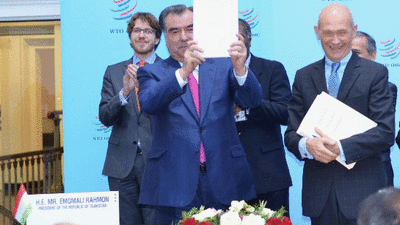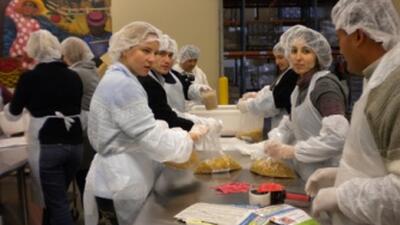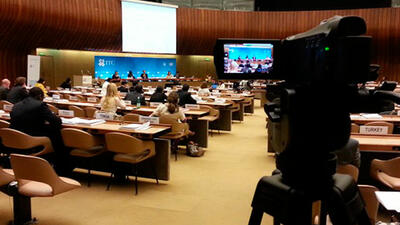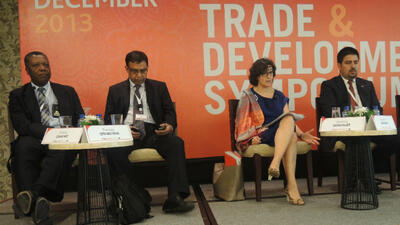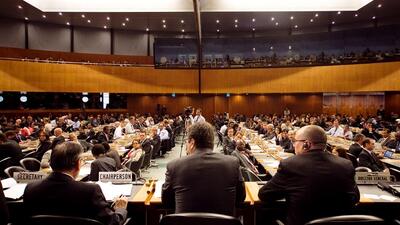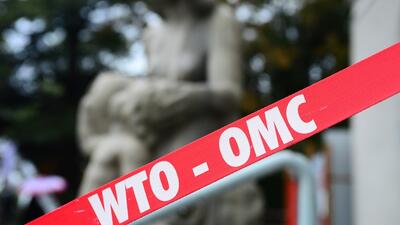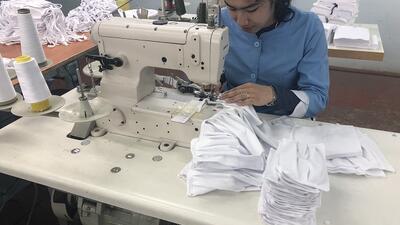Round Table on Food Safety Management (en)
Senior officials from all relevant ministries/agencies that have responsibilities in relation to food safety, as well as other interested parties, were brought together to participate in a free roundtable discussion of the outcome of a study by ITC consultants on the distribution of official roles and responsibilities within Tajikistan’s food safety control system. The intended outcome is to facilitate the development of proposals for improving effectiveness and reducing costs to the public and private sectors by streamlining the organizational arrangements made by the Government.
Mr. Saidrahmon Nazriev, Deputy Minister of the Economic Development and Trade, opened the round table, calling it an important step in achieving progress towards a better system of organization to manage food safety in Tajikistan. He expressed his concern that the duplication of functions affects the price of goods. He mentioned a famous Tajiki proverb:“модари баррача зижд шавад, он бесоҳиб мемонад”, which means “if a child has too many nurses, no one would take proper care of the child”. According to the Tajik Deputy Minister, the price of food in Tajikistan is more expensive than in Russia, although the average salary is eight times less in Tajikistan. He said: “If we would like to trade as a civilized country, we have to enter the WTO. In order to be accepted into the WTO, we have to bring our laws and regulations in line with international standards. Our agencies should not duplicate each other, should not interfere with each other, but rather collaborate for the welfare of society.”
Ms. Malika Ibrohimova, SECO Representative, informed the participants about the activities supported by the Swiss Government related to Tajikistan’s efforts to accede to the WTO. According to her, Switzerland has already been supporting these efforts for ten years and will continue this support, as “we see the political will of the Tajik Government to fulfill all the commitments. We see many good laws adopted, but if all the laws remain solely on paper, this would not speed up the process. We hope that the national interests will be the priority, not the agencies’ priorities.”
The activities, challenges and future plans of ITC’s Trade Promotion Programme in Tajikistan were discussed at the 3rd Project Steering Committee (PSC) meeting on November 29th in Dushanbe.
“Organizational arrangements for food safety management in Tajikistan” were discussed on November 11that a roundtable at the Ministry of Economic Development and Trade of Tajikistan.
Mr. Digby Gascoine, ITC International Consultant on Sanitary and Phytosanitary issues, talking about the principles for organization of a national food safety system, said that the primary responsibility for ensuring the safety of food rests with the enterprises and people who produce, handle and sell food, and that the role of the Government is to ensure that this responsibility is met. Mr. Gascoine said that the food control system should be designed so that it uses public and private resources as efficiently as possible in achieving the appropriate level of protection. As he explained, “duplication of food safety control activities and unnecessary food safety control activities should be eliminated, additional activities should be added where appropriate, and the responsible agencies should cooperate with each other through a standing coordination mechanism at ministerial level”. The Food Safety System Assessment Matrix, prepared by ITC national and international consultants, was also the focus of the roundtable. Mr. Qosim Qurbonov, ITC National Consultant on SPS, who was directly involved in the preparation of the matrix, said that “the data has been gathered by interviewing each ministry/agency and presenting the results in the form of a matrix that shows what each one does at each stage of the food production and distribution chain. Then we have analyzed the matrix to identify places where roles and responsibilities appear to be duplicated, and where there may be gaps.” The event participants also discussed: issues where streamlining could be considered, including priority of action to improve the situation; the main reform options for resolving the concerns so as to produce a more efficient and effective system for food safety control; strategies that could be employed to facilitate improvement of food safety organizational arrangements in Tajikistan, etc.
R-Для доступа к этой статье на русском языке, пожалуйста, нажмите здесь.
T-Барои дастрасӣ ба ин матлаб бо забони тоҷикӣ, лутфан, ин ҷоро пахш намоед.





